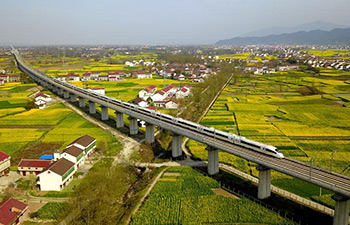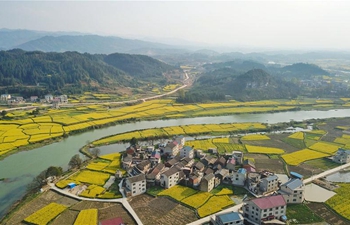
Jeremy Hodara, co-founder and co-CEO of Africa's leading e-commerce platform Jumia, receives an interview with Xinhua in Kigali, Rwanda, March 25, 2019. Africa's leading e-commerce platform Jumia has said it will be "100 percent Africa" for now and the future, and will not target markets outside Africa, due to great opportunities in the continent. (Xinhua/Cyril Ndegeya)
By Xinhua writer Lyu Tianran
KIGALI, March 26 (Xinhua) -- Africa's leading e-commerce platform Jumia has said it will be "100 percent Africa" for now and the future, and will not target markets outside Africa, due to great opportunities in the continent.
Seven years after its establishment, the Nigeria-based company has operations in 14 African countries with 1.2 billion consumers and 29 million products, hotels, restaurants, and other services listed.
There is more than 1 billion people in Africa, which will be doubled in the future, and there will be more African people on Internet than the whole U.S. population, Jeremy Hodara, Jumia's co-founder and co-CEO told Xinhua on Monday in an interview on the sidelines of the two-day Africa CEO Forum.
"We have great opportunities ahead of us and we want to serve those consumers," said Hodara while attending the forum as a speaker of a e-commerce session.
According to him, three components are needed to be a successful e-commerce company in Africa, which are very difficult for local and international companies to combine all of them.
The first is to have right talents and right people to enable the company to know how to do e-ecommerce, he said. It also requires funds for technology, marketing and willingness to be in Africa, he added.
Some reports called Jumia "Africa's Alibaba." One difference Jumia has with Alibaba is its large numbers of Africa's specificities that Alibaba doesn't know and doesn't have, said Hodara.
"You have a lot of little details with everything we do in how you work with sellers, consumers, partners and how you do marketing, which are all very subtle and no one can replicate in Africa outside us," he said.
Jumia signed a partnership with Chinese tech giant Xiaomi at the Mobile World Congress in Barcelona in Feburary, through which Jumia will open the official store of Xiaomi products on its platform and offer devices of Xiaomi exclusively in Africa.
"Xiaomi is really one of the brands that have the most understanding of what it takes to win in emerging countries. Their products, strategy and approach are really the right thing for Africa," said Hodara.
The Chinese company attaches importance to Africa and African consumers, instead of seeing Africa as its last market, he added.
Jumia and Xiaomi have been working together for many years, and the partnership is the realization of years of work, according to him.
Hodara also revealed the existed relationship between Jumia and Chinese companies. Jumia works all the time with other companies in China, and has a team in China working with many Chinese companies in phones, electronics, and televisions, and help them enter and do business in Africa, he said.
In Hodara's eyes, China's ICT and e-commerce companies have a good understanding of e-commerce, and are really committed to being business online.
Jumia is always interested in cooperating with other Chinese companies in Africa, provided they have "keen interest in Africa and right products with Africa," he added.
About 1,500 participants, including Africa's top CEOs, international investors, experts and high-level policy makers, are meeting in Kigali from Monday to Tuesday, discussing major topics and key challenges for Africa's private sector.















